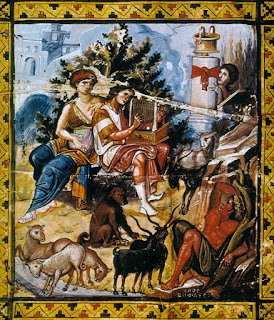Theandrites—Studies in Byzantine Philosophy & Christian Platonism
A new book series, Theandrites, published by Franciscan University Press, will explore Byzantine philosophy and Christian Platonism. Frederick Lauritzen (Historian, Scuola Grande di San Marco, Venezia) and Sarah Klitenic Wear (Professor of Classics, Franciscan University of Steubenville) are the series editors. With the permission of the editors, below is some background on the new series.
The publication of Plotinus’ Enneads in 301, by his disciple Porphyry, ushered a new era of Philosophy, which lasted until the fall of Constantinople in 1453. This philosophy featured a unique dialogue between Hellenic Platonism and the theology of the Church Fathers and Byzantine Christians. This book series explores the topics which first emerged during this period: Platonism, primarily among thinkers in the Greek-speaking East and their relationship to the Latin tradition in the West, as well as the Christian Platonism found in contemporary Church Fathers, the Greek-speaking Christians in late antique Gaza, Athens, and Alexandria; the philosophical theology of Pseudo-Dionysius the Areopagite, Maximus the Confessor, and John Damascene; the later reception of Platonic theories on the soul, time, and eternity, and metaphysics, as well as ritual among Greek Christians and Hellenes. The series will also promote studies on the Aristotelian commentaries according to a Platonic background as they appear during this period (Commentaria in Aristotelem Graeca). The series will focus primarily on the Greek tradition, although manuscripts on the Latin tradition of Christian Platonism, particularly when that tradition is in dialogue with the Greek tradition, will be considered.
This is the first book series focusing solely on philosophy in Byzantium and Christian Platonism (284–1453). This series encourages one to trace Platonic ideas and terminology as it moves throughout the Eastern Roman Empire and the Byzantine Orthodox world. This tradition is an essential part of the history of ideas since the Greek texts studied in the Syriac and Arabic worlds originated in the Greek speaking world during this time frame. Thus Syriac Christians and Arabic Muslims translated texts offered to them by Byzantine scholars and philosophers from the IV century onwards. The same is true during the Renaissance in Italy (XV century) when for the first time since the fall of the West Roman Empire in 476, the Latin speaking world was given proper access to Greek Philosophy in the original language by Byzantine thinkers such as Bessarion (1403–1472) and George Gemistos Plethon (ca. 1355–1452/4).
Series editors will consider monographs, edited volumes, and translations. Send manuscripts to: theandrites@gmail.com
Contact Frederick Lauritzen (frederick.lauritzen@new.oxon.org) or Sarah Klitenic Wear (swear@franciscan.edu) with questions.
The publication of Plotinus’ Enneads in 301, by his disciple Porphyry, ushered a new era of Philosophy, which lasted until the fall of Constantinople in 1453. This philosophy featured a unique dialogue between Hellenic Platonism and the theology of the Church Fathers and Byzantine Christians. This book series explores the topics which first emerged during this period: Platonism, primarily among thinkers in the Greek-speaking East and their relationship to the Latin tradition in the West, as well as the Christian Platonism found in contemporary Church Fathers, the Greek-speaking Christians in late antique Gaza, Athens, and Alexandria; the philosophical theology of Pseudo-Dionysius the Areopagite, Maximus the Confessor, and John Damascene; the later reception of Platonic theories on the soul, time, and eternity, and metaphysics, as well as ritual among Greek Christians and Hellenes. The series will also promote studies on the Aristotelian commentaries according to a Platonic background as they appear during this period (Commentaria in Aristotelem Graeca). The series will focus primarily on the Greek tradition, although manuscripts on the Latin tradition of Christian Platonism, particularly when that tradition is in dialogue with the Greek tradition, will be considered.
This is the first book series focusing solely on philosophy in Byzantium and Christian Platonism (284–1453). This series encourages one to trace Platonic ideas and terminology as it moves throughout the Eastern Roman Empire and the Byzantine Orthodox world. This tradition is an essential part of the history of ideas since the Greek texts studied in the Syriac and Arabic worlds originated in the Greek speaking world during this time frame. Thus Syriac Christians and Arabic Muslims translated texts offered to them by Byzantine scholars and philosophers from the IV century onwards. The same is true during the Renaissance in Italy (XV century) when for the first time since the fall of the West Roman Empire in 476, the Latin speaking world was given proper access to Greek Philosophy in the original language by Byzantine thinkers such as Bessarion (1403–1472) and George Gemistos Plethon (ca. 1355–1452/4).
Series editors will consider monographs, edited volumes, and translations. Send manuscripts to: theandrites@gmail.com
Contact Frederick Lauritzen (frederick.lauritzen@new.oxon.org) or Sarah Klitenic Wear (swear@franciscan.edu) with questions.



Comments
Post a Comment